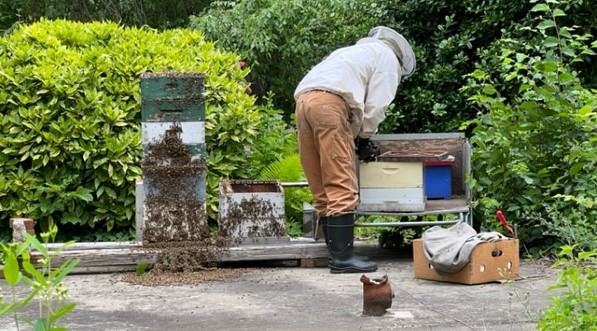By Brendan Stiteler
Gardener & Grounds Associate
With the goal to support local bee colonies and native pollinators, Pendle Hill decided to reopen an apiary early this spring. Our hope is to be able to offer the fruits of these efforts to our community in the form of our very own Pendle Hill Honey foraged from the bees who live and work among us here at Pendle Hill.

Beekeeper Warren Graham tends to his charges.
It takes experience to be able to pick out the different prominent flowers that dominate the character of a honey. Our beekeeper Warren Graham learned from his father on their farm which is now part of Ridley Creek State Park. Warren brings a lifetime of bee knowledge and expertise and could tell that this season the Russian or Autom Olive was the predominant forage influencing the color, smell, and taste of the honey. We may notice bees on many different flowers but in our region what really makes up the “honey flow” is the spring blooming trees with traditionally the tulip poplar and now, more and more, the black locust taking the dominant role, with the Autom olive, linden, and walnut trees also providing significant sources.
With the heat and dry conditions of the summer it becomes harder for the bees to collect significant quantities of nectar for honey – pollen is their protein source important for raising their brood – and their foraging is spread among a more diverse array of flowers. This spring was good for our hive and we had an excellent harvest. With a little luck, we’ll be able to harvest again later this season which would have the character of a late season array of flower forage!


